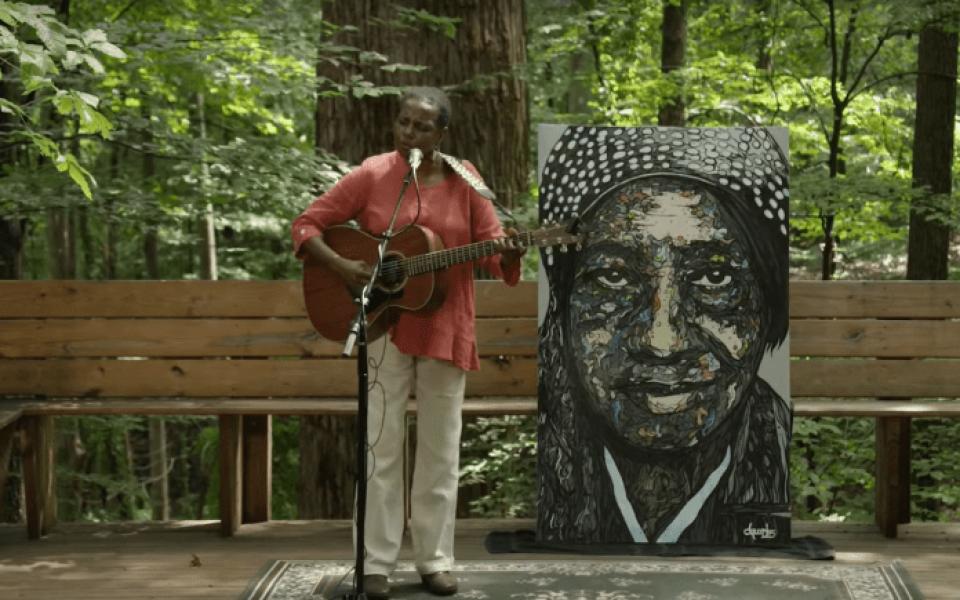Featured photo: Veronika Jackson, a blues singer from Atlanta, performed a tribute to the late blues and folk musician Elizabeth “Libba” Cotten during the 2020 Folk Festival. (screenshot)
The camera tilts upwards along the green tower and shows the tolling bell at the Charlotte Hawkins Brown Historic Site in Gibsonville. The bell served as a timekeeper and now, it marks the beginning of the NC Folk Festival. It’s the location of country and Southern soul singer Rissi Palmer’s folk festival performance.
This year’s folk festival, filmed by 7 Cinematics, took place as a virtual concert series this year as a precaution against the coronavirus. The festival began on Sept. 11 and each day of the three-day event, pre-recorded musical performances from solo and group acts were live-streamed from the festival’s Facebook page, nugs.tv and the City of Greensboro’s YouTube channel.
The series opened on Friday with Lacey Wilson, site manager at the museum, offering a brief history lesson of the former school for Black high school students, explaining the significance of the bell keeping students on a strict schedule.
“We are set up in front of this bell tower,” Wilson said. “Students would live and die by this bell directly behind me.”
She continued, “A senior boy would be the one who would ring it at particular times. The bell would ring when you needed to be up, when you needed to be at lunch and dinner and breakfast.”
Palmer made her mark in country music by becoming the first Black woman to chart a country song since Dona Mason in 1987. Her debut single, “Country Girl,” reached number 54 on the Billboard Hot Country Songs in 2007. She now hosts an Apple Music radio show highlighting the history of country artists of color, “Color Me Country”. For her folks festival performance, she stood in the street in front of the tower with her ensemble of two guitarists, one drummer and one keyboard player.
“I got my sweet, sweet lovin’ on you,” she sang as she strummed her guitar and danced to the beat of the song, not letting the height of her heels restrain her movements.
She slowed things down with “Breathe In, Breathe Out,”a power ballad she wrote to inspire people to stand up for what they believe in, especially injustice in the world.
“I just wanted to give encouragement to people who want to say something but they’re not really sure what to say,” she said during the performance.

Country singer Rissi Palmer performed at the Charlotte Hawkins Brown Historic Site in Gibsonville. (screenshot)
After finishing her set with the title track from her album Revival, the camera showed Palmer leaving the area and passing under the bell as it rang three more times, representing the end of her performance.
On Saturday, Veronika Jackson, a blues singer from Atlanta, performed a tribute to the late blues and folk musician Elizabeth “Libba” Cotten. Her performance was in partnership with the 34th annual Carolina Blues Festival.
James Shields, the director of the Bonner Center at Guilford College, stood in front of the Underground Railroad Tree and told the stories of the former slaves that passed through those very woods, including how the songs they sang connect us to today’s blues music.
“There were so many things that the spirituals did in order to uplift people,” he said. “But it was also a way to let people know, ‘This is my condition.’”
He continued, “Spirituals, just like the blues, were not so much about despair, but it was about the triumph over oppression.”
The tree is located near the New Garden settlement of the Quakers, who believed that the “light of God was in every person,” according to Shields.
The Quakers would see enslaved Africans heading towards the tree longing for freedom and would bring them food and information to assist them.
Shields then introduced a biographical video of Cotten presented by the NC Hall of Fame. The video described Cotten as someone who was “mostly unheard and unknown for years,” and Jackson was determined not to let that happen again.
Jackson, standing in front of a portrait of Cotten, performed her song “Freight Train.”She kept her performance minimal, opting only to sing and play guitar.
She finished her set with her original song “Clouds are Passing.”
Finishing off the festival on Sunday was Mandolin Orange, a folk duo from Chapel Hill consisting of Andrew Marlin and Emily Frantz who recorded their performance at the First National Bank Field in Greensboro.
“Hiding from the monsters in the belly of the beast,” they sang in their opening song, “Belly of the Beast,” as they harmonized.
Before performing their final song, Frantz stopped to admire the beauty of the setting sun, signifying the end of their set and the festival.

Chapel Hill duo Mandolin Orange performed at the First National Bank stadium in Greensboro. (screenshot)
“This was always our favorite time of day to play a set,” she said. “While the sun is going down and, you know, we’re not quite rowdy enough to play at night but this is perfect.”
“We’re a good sunset band,” Marlin agreed. “An early-morning band as well.”
“Here’s one of the most festival-y ones,” Frantz said, as they transitioned into their song, “Old Ties and Companions.”
Songs of resilience proved popular during this year’s festival as people strive to persevere and remain positive during this time of uncertainty.
On Friday, the livestream began with a montage of past folk festival footage.
“See you next September,” the narrator of the montage said in the hope that next year, the festival could return to its roots — lovers of folk music enjoying the performances in person.
The live streams from each day of the festival will remain on the City of Greensboro’s YouTube channel for on-demand viewing.
Join the First Amendment Society, a membership that goes directly to funding TCB‘s newsroom.
We believe that reporting can save the world.
The TCB First Amendment Society recognizes the vital role of a free, unfettered press with a bundling of local experiences designed to build community, and unique engagements with our newsroom that will help you understand, and shape, local journalism’s critical role in uplifting the people in our cities.
All revenue goes directly into the newsroom as reporters’ salaries and freelance commissions.


Leave a Reply